Right to Work Indiana’s Employment Revival
In the seven years that immediately followed Indiana’s Right to Work adoption, the total number of employed Hoosiers grew every year.
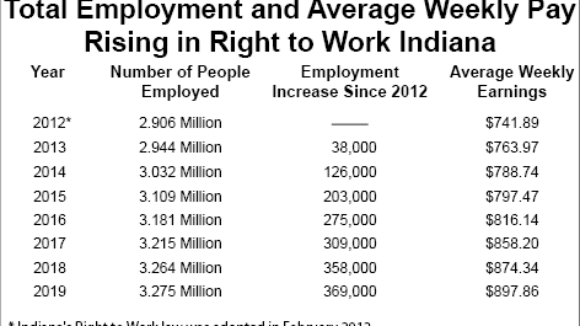
In the seven years that immediately followed Indiana’s Right to Work adoption, the total number of employed Hoosiers grew every year.
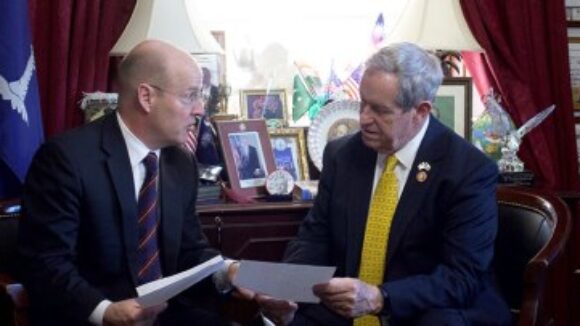
Congressman Joe Wilson (R-SC) has introduced the National Right to Work Act (HR 2571) in the U.S. House.

Rand Paul Introduces National Right to Work Act to End Forced Union Dues for Workers National Right to Work President applauds legislation that would prevent union officials from extracting union dues from workers as a condition of employment Washington,…
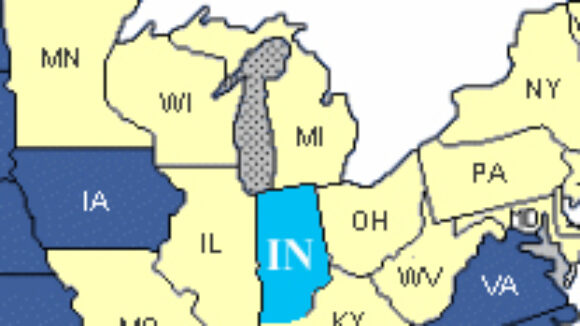
When Governor Mike Pence became Indiana’s Chief Executive, former Governor Mitch Daniels and the state legislator had already enacted the state Right to Work law. But, Governor Pence is one of the biggest supporters of Right to Work…
Union bosses in Indiana are pressing for a judicially imposed bailout, arguing that the state's new Right to Work Law will reduce revenues to the union since membership is no longer compulsory. The LibertyLawSite looks at the lawsuit and the impact the law has had on job creation in the state: Amidst a series of setbacks at both the ballot box and the court house, the fate of the compulsory union movement may depend in large measure on the outcome of two lawsuits currently pending in Indiana. In early 2012, Governor Mitch Daniels signed into law a bill that made Indiana the nation’s twenty-third right-to-work state. Unions have filed two challenges to that law, one each in state and federal court. The outcome of those lawsuits will help to determine whether Indiana remains a right-to-work state and whether other states follow Indiana’s lead. In its first few months of operation, the right-to-work law has, by almost any measure, helped to attract new businesses to Indiana. Indiana has only 2.2 percent of the nation’s population. In April, the first full month after the law took effect, more than one in eight jobs created around the country were created in Indiana – more than in states several times the size of Indiana. According to the state’s economic development arm, almost fifty out-of-state companies cited the right-to-work law as one reason that they were considering opening a location in Indiana.
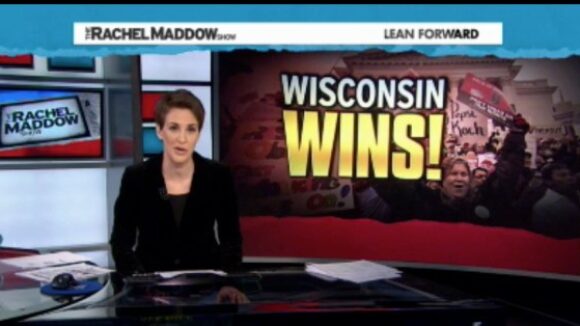
Fox All Star and syndicated columnist Charles Krauthammer discusses the meaning of the Wisconsin recall election and how taxpayers have finally had enough of Big Labor's power and pocketbook grabs while union bosses claimed mythical societal benefits arose from forced-dues: Tuesday, June 5, 2012, will be remembered as the beginning of the long decline of the public-sector union. It will follow, and parallel, the shrinking of private-sector unions, now down to less than 7 percent of American workers. The abject failure of the unions to recall Wisconsin Gov. Scott Walker (R) — the first such failure in U.S. history — marks the Icarus moment of government-union power. Wax wings melted, there’s nowhere to go but down. The ultimate significance of Walker’s union reforms has been largely misunderstood. At first, the issue was curtailing outrageous union benefits, far beyond those of the ordinary Wisconsin taxpayer. That became a nonissue when the unions quickly realized that trying to defend the indefensible would render them toxic for the real fight to come. But as the recall campaign progressed, the Democrats stopped talking about bargaining rights. It was a losing issue. Walker was able to make the case that years of corrupt union-politician back-scratching had been bankrupting the state. The real threat behind all this, however, was that the new law ended automatic government collection of union dues. That was the unexpressed and politically inexpressible issue. That was the reason the unions finally decided to gamble on a high-risk recall. Without the thumb of the state tilting the scale by coerced collection, union membership became truly voluntary. Result? Newly freed members rushed for the exits. In less than one year, -AFSCME, the second-largest public-sector union in Wisconsin, has lost more than 50 percent of its membership.
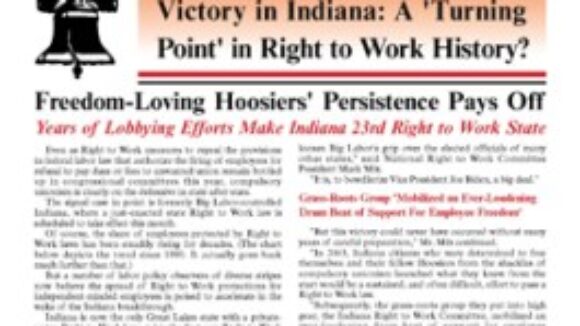
March National Right to Work Committee newsletter Special Supplement online Here’s a quote: Abby Rapoport, a staff writer for the pro-forced unionism American Prospect, fears the…

March National Right to Work Committee newsletter Special Supplement online Here’s a quote: Abby Rapoport, a staff writer for the pro-forced unionism American Prospect, fears the…
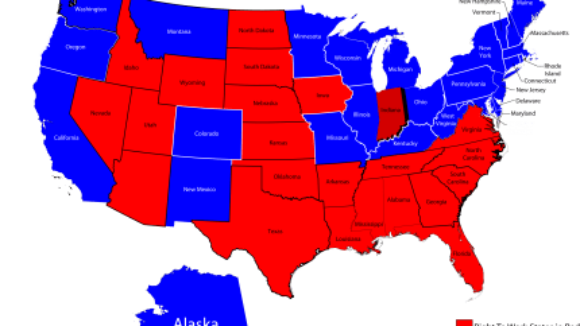
After years of intensely lobbying their elected officials and mobilizing their fellow citizens, pro-Right to Work Hoosiers saw a measure prohibiting forced union dues and fees signed into law this month. Indiana Becomes the 23rd State to Abolish Forced Union Dues (source: National Right To Work Committee February 2012 Newsletter) Just as this edition of the National Right to Work Newsletter went to press, Indiana became the 23rd state to adopt a Right to Work law prohibiting union officials from taking money from employees' paychecks as a condition of getting or keeping a job. In the late afternoon on January 25, a 54-44 majority in Indiana's state House of Representatives stood up to taunts and threats emanating from the hundreds of union bosses and other Big Labor militants who had been crowding the halls of the capitol for hours. Consequently, H.B.1001, a measure making it illegal to fire employees for refusal to pay dues or fees to an unwanted union, was adopted and sent to the state Senate. On February 1, the Senate, which had already passed another version of the Right to Work legislation, 28-22, approved H.B.1001 and sent it to GOP Gov. Mitch Daniels's desk. Heeding the pleas of thousands and thousands of Hoosiers who passionately oppose compulsory unionism, late last year Mr. Daniels had publicly announced he was strongly in favor of making Indiana a Right to Work state.